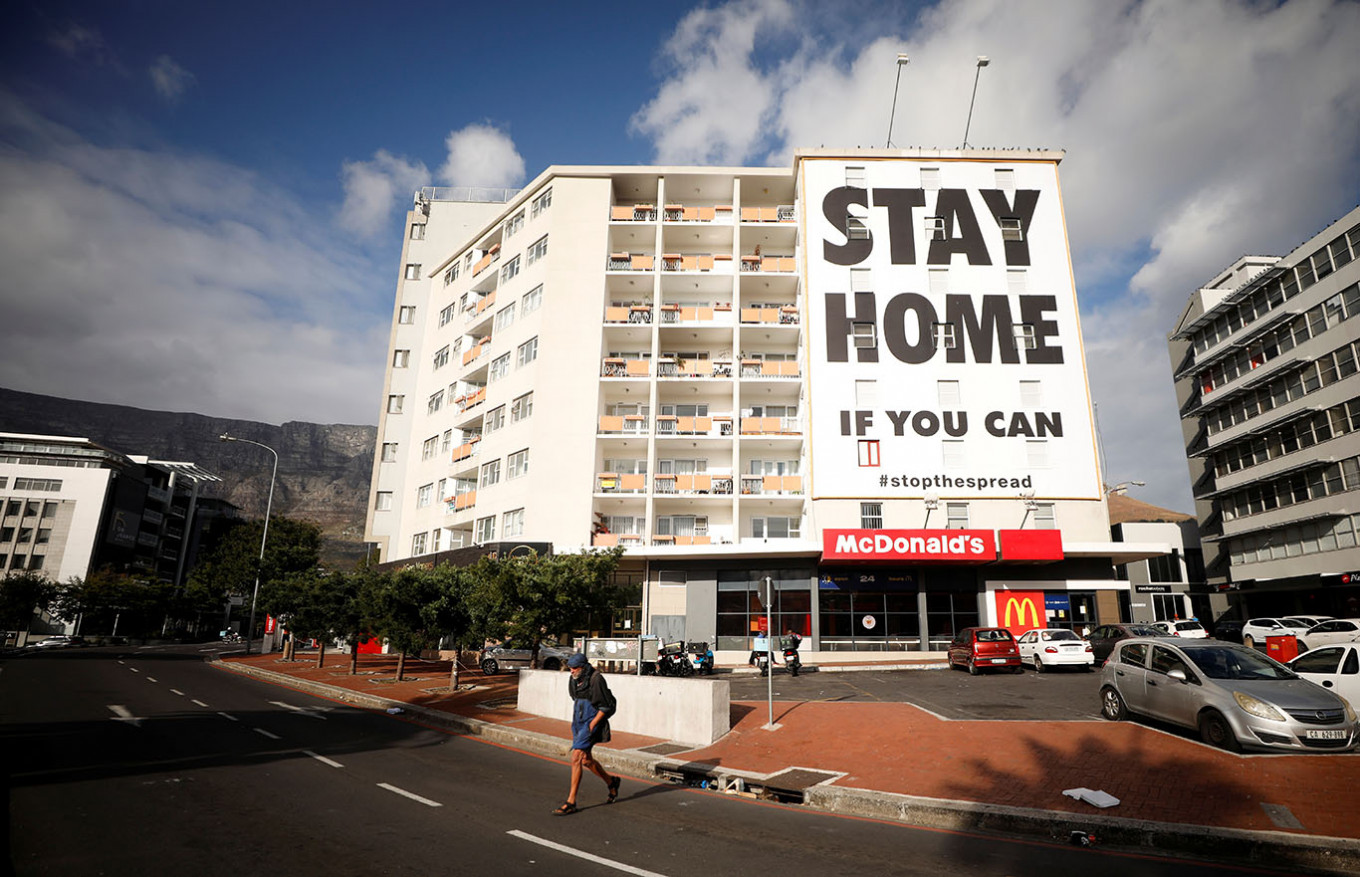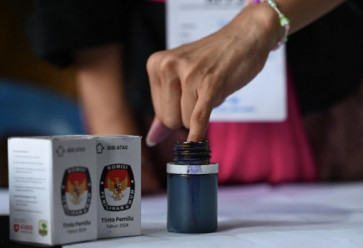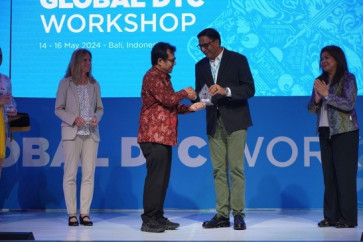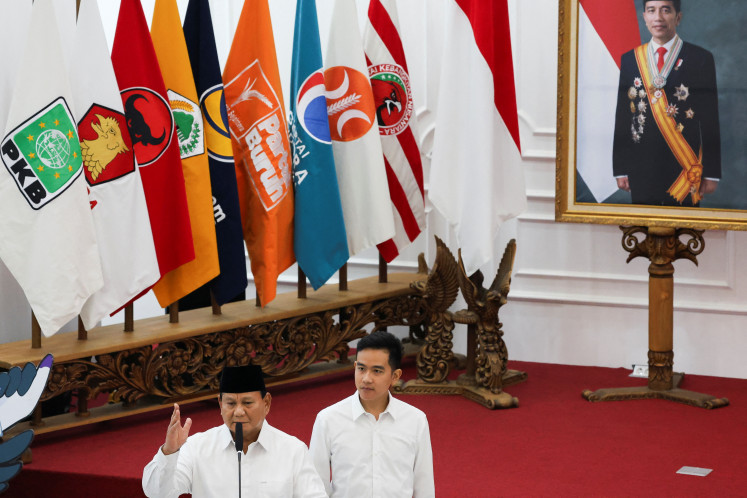'Proud to be Indonesian': Student stranded for months in South Africa shares her story
I cannot describe the shift in the spectrum of emotions I felt the day the consulate took me in. I went from the most anxious state I have ever been in, to feeling calm and completely safe, all with appreciation to the consulate.
Change Size
 A man walks past a poster covering the side of a building ahead of a 21 day lockdown aimed at limiting the spread of COVID-19 in Cape Town, South Africa, on March 26. (REUTERS/Mike Hutchings)
A man walks past a poster covering the side of a building ahead of a 21 day lockdown aimed at limiting the spread of COVID-19 in Cape Town, South Africa, on March 26. (REUTERS/Mike Hutchings)
T
here are four pillars for a diplomatic mission abroad: representing, promoting, negotiation and protecting. The coronavirus pandemic has brought unique challenges to the country’s modern diplomats, leaving thousands of students, tourists, seafarers, workers, and even diplomats themselves, stranded abroad.
Embassies and consulates have to be proactive to carry out the different ways citizen protection can be accomplished. This ranges from negotiating with relevant parties to ensuring efficient communication with all citizens in their territory and prioritizing their physical health while also acting calm amid the global panic, uncertainties and constant pressure.
I’m an Indonesian postdoctoral student studying the United Kingdom, who arrived in South Africa in mid-March for a university sports team trip. The advice and regulations on domestic and international flights, as well as border control for various countries, were changing by the hour – I left the UK after being given the green light by the university, but as I arrived in Cape Town, it was clear that the situation had altered.
None of my teammates made it. The facts were the following: I was by myself, in a foreign country with no-one I knew, in the middle of a pandemic.
Via the WhatsApp hotline advertised on the website of the Consulate General of Indonesia in Cape Town, I contacted Gadis Ranty, the consul for consular affairs. She kept me up to date with local regulations and checked on me every couple of days.
However, after a couple of flight cancellations, and a strict nationwide lockdown – involving border closures and a ban on commercial air travel – I became stranded in South Africa.
On the evening of March 23, I was at the airport by myself, scared, in a state of panic, with no options left on the table. In desperation, I contacted Gadis.
Mohamad Siradj Parwito, the consul general for Indonesia in Cape Town, invited me to stay at his state-owned residence, when I had nowhere to go.
Only when I arrived at the residence did they ask me about administrative matters; they knew nothing of me apart from my occupation. In fact, the only thing they cared about was that I was an Indonesian citizen, which meant that it is their constitutional duty to put me under their protection. In his words: “This residence belongs to the country, not me personally. Here, you are a guest of Indonesia, but so am I – you have every right to be here.”
I cannot describe the shift in the spectrum of emotions I felt the day the consulate took me in. I went from the most anxious state I have ever been in, to feeling calm and completely safe, all with appreciation to the consulate.
During my stay, I had access to all the facilities of the residence, baked some Indonesian sweets together with the kitchen staff, and shared many delightful, gripping conversations with the consul general, his wife and an intern to the consulate. I witnessed firsthand the challenges the consulate faced in response to the evolving nature of the pandemic, and the difficult, quick decisions they had to make.
Unfortunately, one seafarer lost his life at sea, and due to the restrictions on international flights, had to be buried in a Muslim cemetery in Cape Town without the physical presence of family members. Other seafarers were flown on a Japanese repatriation flight, and with coordination with the Japanese government, they were allowed to disembark in Japan to fly on a commercial airline home.
At the beginning of the lockdown, the consulate was also proactive in making sure that all other Indonesians in the region were documented and assisted.
Gadis continuously kept me up to date with the changing regulations and in particular, kept asking me how I was doing – a simple, powerful question to ask during a period of uncertainty. I never felt alone, and I had complete trust in the consulate to assist me.
I stayed with the consul general for more than six weeks. It was never clear when the South African government would allow commercial flights to reopen, as the original three-week lockdown (Level 5) was extended to five, only to be followed by a tiered system under which international flights would only be allowed at Level 1.
Read also: A greater adventure: Pandemic traps long-term travelers on an even rougher road
When a repatriation flight was organized by the Indonesian Embassy in South Africa in Pretoria and the consulate in Cape Town, in coordination with the South African government and South African Airways, I leapt at the only chance of getting out of the country.
I said goodbye to those with whom I had shared the past six weeks, feeling conflicted – sad to leave what felt like my family in Cape Town, but very happy to be reunited with mine at home. I thanked them, though I'm not sure I'll ever be able to repay their kindness.
On May 5, nine Indonesians took an 18-hour road journey from the consulate in Cape Town to the Indonesian Embassy in Pretoria, which included a police escort past the lockdown curfew. When I met other stranded Indonesians, they all had their own unique stories: seafarers at the end of their sails, workers having finished their employment and travelers waiting for refunds of dozens of millions of rupiahs from airlines as they desperately bought multiple tickets trying to get home. One lady had to say goodbye to her South African husband for an indefinite amount of time, as his Indonesian temporary stay permit (KITAS) had expired – he had to wait until South Africa opened its borders, and for Indonesia to allow non-resident foreigners into the country.
After a filling out a plethora of paperwork in the embassy, we were escorted by the South Africa national travel police to OR Tambo International Airport in Johannesburg, which was completely empty.
Twenty-seven Indonesians flew on the 10-hour flight from Johannesburg to Denpasar in Bali – the first time the route had been flown.
On arrival in Bali, we were greeted by the military and Health Ministry officials as we were screened and tested for antibodies before flying to Jakarta the next day. The aircraft flew back to Johannesburg carrying stranded South Africans from Jakarta and Bali, and they all, including the volunteer crew, would be quarantined at a government facility for two weeks.
On landing at Soekarno-Hatta International Airport in Tangerang, Banten, I shed a few tears of relief. It was finally over. I completed my 14-day self-isolation at my family’s home, thankfully with no issues.
What was supposed to be a 10-day trip to Cape Town turned into three-and-a-half months away in two different countries with many new experiences and lessons learned. I was completely dependent on others, and I received nothing but kindness and warmth.
I am eternally grateful to the Foreign Ministry for taking care of its citizens abroad, especially with the challenging landscape resulting from the pandemic.
More than ever, I feel proud to be Indonesian. (kes)
***
Hayyu Imanda is a DPhil Researcher at the Center for Doctoral Training in Cyber Security, University of Oxford.






